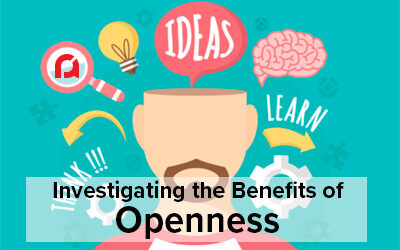Of the Big 5 personality traits (openness, conscientiousness, extraversion, agreeableness, and emotional stability), those who possess the openness trait are the innovators that can fill the workplace with quick wit and wonder.
The Upsides of Openness
Open people tend to be:
- Creative
- Insightful
- Curious
- Tolerant/receptive
- Adaptable
Openness is often associated with open-mindedness, creativity, a willingness to listen to multiple viewpoints, and with being the most open to change.
This welcoming whirlwind of ideas can often be an asset to a creative work environment. In certain roles, however, it can be associated with occasional disarray and delay.
The Downsides
All the creative tolerance and ingenuity of those who score high in openness comes with a few negatives, however, as those who are highly open can also be:
- Distracted
- Spontaneous
- Easily bored
- A change agent
Although high openness is not typically associated with many negative qualities, the wrong fit can lead to boredom and distractibility.
The curious and imaginative nature of people who score high in openness may also not gel with others if they become too much of a change manager when it isn’t really warranted.
Being open to too many ideas, therefore, may cause issues if placement does not facilitate their big ideas and creativity.
Understanding Individuals with High Levels of Openness
Psychologists have a lot to say about openness.
To narrow the field’s views of the trait, Woo et. al conducted a study (2013) to define the trait’s Openness to Experience implications, with a six-facet framework that encompasses how individuals with this trait may experience thinking.
Openness to Experience, researchers said, is an umbrella term that contains both physical and thinking experiences.
The six facets of Openness to Experience are:
- Intellectual Efficiency: Processing information quickly
- Ingenuity: Clever, outside-the-box thinking
- Curiosity: Passion for finding out how things work
- Aesthetics: Caring about the beauty of things
- Tolerance: Comfortable with diverse viewpoints
- Depth: Capacity for reflection and personal growth
However, some psychologists disagree with Woo’s assessment that the trait consists of intellectual efficiency. A 2010 psychological study reveals that openness correlates with verbal intelligence, but not necessarily executive function.
Careers Typically Suited for “High Openness” Workers
Those who score high on openness are adaptive to new challenges. Excited by new experiences and creativity, careers that offer a chance to be expressive, need a high degree of tolerance for diversity, or are ever-changing are great fits for open workers.
Examples include:
- Travel agent
- Designer
- Lawyer
- Executive
- Entrepreneur
Some careers may be less of a fit for those who score high on openness, however. Data-driven and conventional careers may not be stimulating enough to engage a free-thinking innovator.
Examples include:
- Academia
- Accountant
- Auditor
- Finance
In Conclusion: Employers Should Match the Mind to the Matter
Creating a work environment that nurtures learning, innovation and creativity, or requires employees to be flexible, adaptive, and to learn new ways of doing things may need to include this intelligent, out-of-the-box thinker.
The energetic, creative supercharge of a person who scores high in openness may be just the jolt needed to produce new and innovative outcomes.
However, be mindful of the lack of structure this creative energy may produce.
With intuitive thinking and spontaneity often comes some level of disarray, so a mix of more dependable traits with this intelligent dynamo may produce more optimal outcomes.




